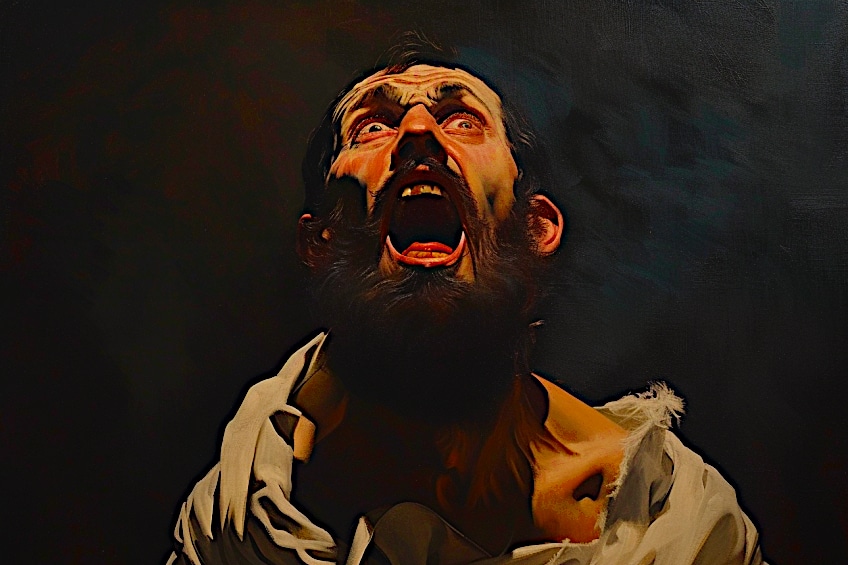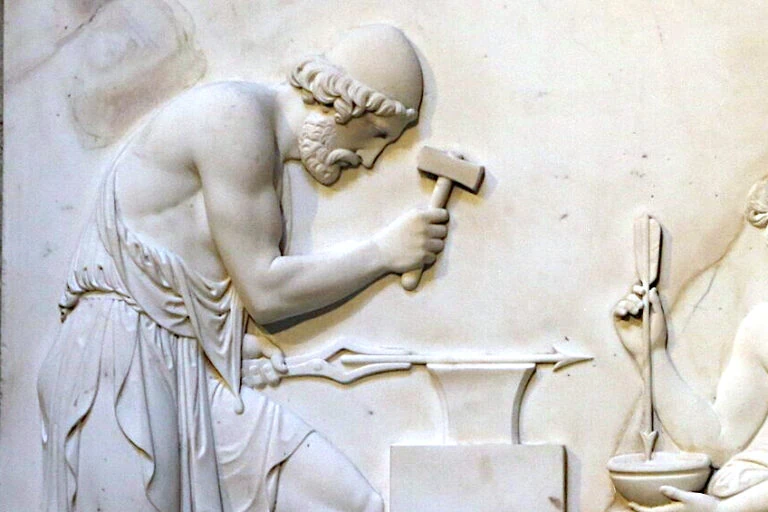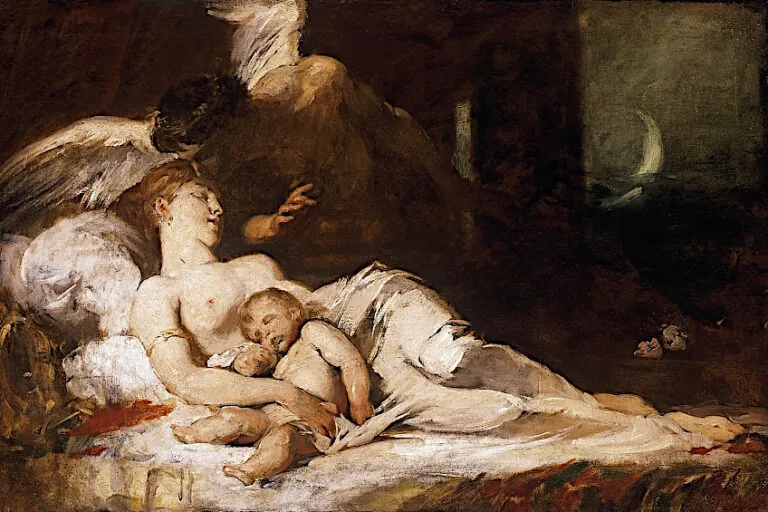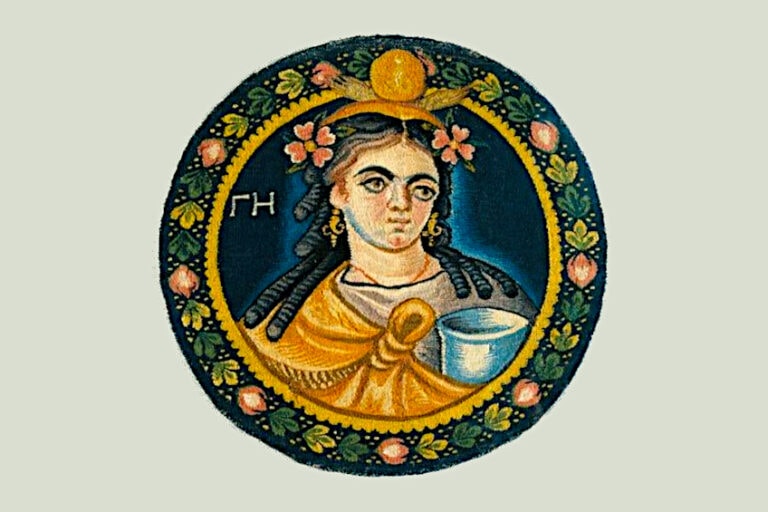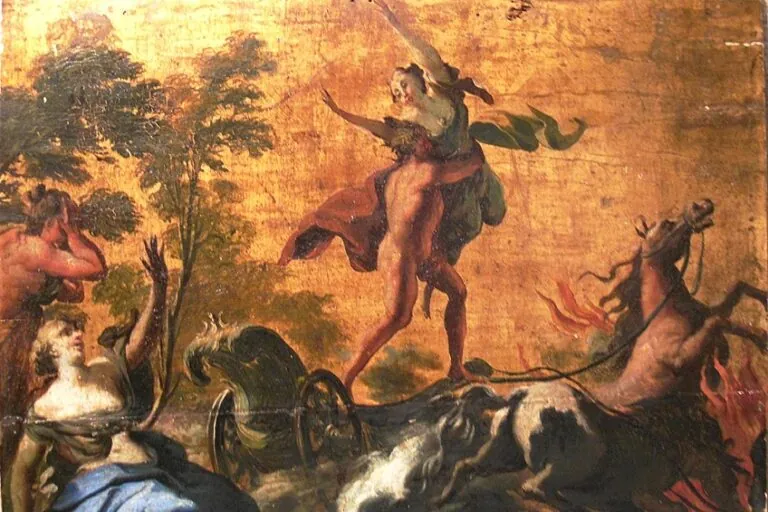Greek God Coeus – The Titan Who Lost His Mind
Greek mythology is full of mysterious beings lost to time, and one of the more obscure figures is that of the Greek god Coeus. As one of the Titans who overthrew Uranus and ruled the golden age and the heavenly axis, Coeus is a figure surrounded by speculation of intelligence and prophecy but who eventually went mad in the depths of Tartarus. Come with us as we uncover the fragments of this ancient god and the theories that surround him in the article below!
Contents
The Northern Pillar of Heaven: The Greek God Coeus
| Name | Coeus (Also known as Koios or Polus) |
| Gender | Male |
| God of | The Heavenly Axis and Intelligence |
| Personality | Belligerent, frantic, and determined |
| Consorts | Pheobe |
| Children | Leto and Asteria |
| Parents | Gaia and Uranus |
Coeus, also known by his Greek name Koios, is a member of the group of Titan children born from the union of Gaia and Uranus. Very little is known of Coeus as he is rarely mentioned in surviving writings and as a Titan was unlikely to have had any influence or cult.
When the Titans came to power, he was supposedly assigned the role of the northern pillar holding up the sky and came to be associated with, and called, ‘Polos’, the heavenly axis. The god is most noted in history for his relations to other deities of Greek mythology and his eventual insanity.
Coeus’ Background and Family
Coeus is actually the Latinized version of this god’s name, with the original Greek name being that of “Koios”.
His origin is mostly speculation, however the Titans in general, and Coeus and his brother’s role as pillars holding up the heavens in particular, are suggested to have been borrowed from cosmogonies of the near-East.
Titans usually have little active role in mythology or the cult life of the ancient Greeks and thus most of our information about Coeus is speculation concerning his role in the cosmogony and his few appearances in myth. A Coeus is said by Tacitus to have been the first occupant of Kos, the island birthplace of Leto, and his name Koios eventually reflected this association.
 View of Marmari on the island of Kos; Michal Osmenda from Brussels, Belgium, CC BY-SA 2.0, via Wikimedia Commons
View of Marmari on the island of Kos; Michal Osmenda from Brussels, Belgium, CC BY-SA 2.0, via Wikimedia Commons
His name Koios itself is suggested to translate to meaning “query”, “questioning”, or “intelligence” and has spawned theories over the domain and personage of this obscure figure of mythology.
Family of the Greek God Coeus
Coeus is one of the original twelve Titan children of Gaia and Uranus listed by Hesiod’s Theogony (8th-7th century BCE). His siblings through them are the other eleven Titans, Oceanus, Iapetus, Krios, Kronos, Hyperion, Tethys, Themis, Rhea, Theia, Mnemosyne, and Pheobe. The twelve Titans are a sibling group to the groups named the Hecatoncheiries, the Erinyes, the Meliae, the Cyclopes, and the Gigantes.
His name also appears once in a list of the last group, the Gigantes, meaning he could have played a role in the Gigantomachy as he was born before them but this may be a simple error.
Coeus has other siblings and half-siblings throughout various mythological works, such as Aphrodite, Eurybia, and Python, and many others. He took as wife his sister, one of the Titaness’ called “shining” Phoebe, and they had two daughters, the elder being the goddess Leto and the younger being the goddess Asteria. Leto bore the Olympian sun-moon siblings Artemis and Apollo, while Asteria is considered the mother of the goddess Hecate, making Coeus the grandfather to several key players in Greek mythology.
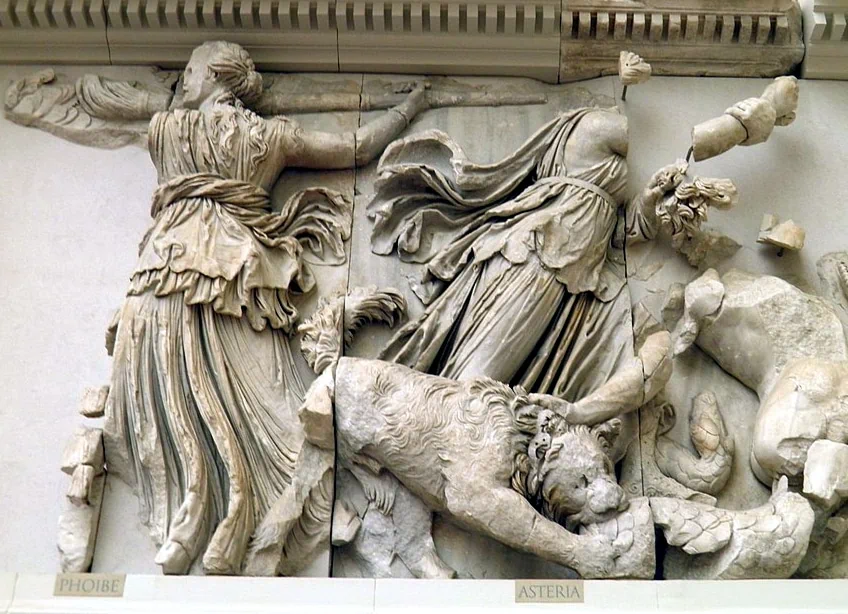 Detail from the frieze of the Great Altar at Pergamon showing Phoebe and Asteria fighting side-by-side in the Gigantomachy (2nd Century BCE); Carole Raddato from FRANKFURT, Germany, CC BY-SA 2.0, via Wikimedia Commons
Detail from the frieze of the Great Altar at Pergamon showing Phoebe and Asteria fighting side-by-side in the Gigantomachy (2nd Century BCE); Carole Raddato from FRANKFURT, Germany, CC BY-SA 2.0, via Wikimedia Commons
Coeus’ Role in Ancient Greek Mythology
From our few surviving sources Coeus’ main role in myth is assumed to be the cosmological role shared by many of the Titans. The gods of Greek mythology are the personifications of many natural forces and concepts the Greeks observed in their world, and the Titans in particular are employed to explain what came before the Olympian gods. Titans thus often serve a dual cosmological and genealogical role from their earlier placement in mythology.
Coeus himself serves as the heavenly axis, and the grandfather of Apollo, Artemis, and Hecate; however, some have suggested he is the Titan god of intelligence and is the god who embodies the quality of intellect.
The Titan of the North
In the beginning of Greek mythology Uranus, the primordial sky father, would couple with the earth mother Gaia and they produced many children. He would imprison two groups of their offspring, the Hecatoncheiries, and the Cyclopes deep beneath the earth, angering Gaia. When Gaia urged her Titan children to rise up against their father Uranus, only Cronus was brave enough to take up arms.
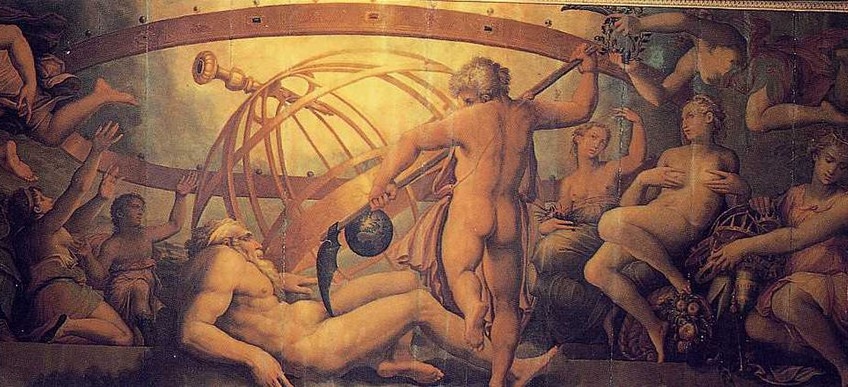 The Mutilation of Uranus by Saturn (Cronus) by Giorgio Vasari (16th Century); Giorgio Vasari, Public domain, via Wikimedia Commons
The Mutilation of Uranus by Saturn (Cronus) by Giorgio Vasari (16th Century); Giorgio Vasari, Public domain, via Wikimedia Commons
It is said that all the Titan brothers assisted him in overthrowing Uranus, holding their father down so Cronus could strike. Thus, Koios helped usher in and rule over the Greek Golden Age. In a popular if unsupported version of the myth, Kronos gave his brothers Iapetos, Hyperion, Krios, and Koios great honors and they became the four pillars that upheld the heavens from the earth. Koios was regarded as the northern pillar, though whether this is because of, or the cause of, his association with ‘polos’ is unclear.
By Roman times at least Coeus was referred to as Polus or Polos, with ‘polos’ being the Greek word that refers to the heavenly axis. The central axis was believed to be the axis upon which the heavens and the constellations therein turned and has become an association of Coeus.
After their loss to the Olympians, Koios was one of the male Titans imprisoned in Tartarus following the Titanomachy. The Argonautica (1st century CE) mentions Coeus as he, tortured in the depths of Tartarus and mad from it, manages to break his chains and attempts to flee only to have his plans thwarted by the guardians of the underworld Cerberus, Hydra, and the Furies. The work Prometheus Unbound (5th century BCE) supposedly said that Zeus released the Titans from Tartarus, but the work itself has not survived to the modern day.
Coeus’ Obscure Domain
Coeus’ Greek name Koios, having been suggested to mean “query”, “questioning”, or “intelligence”, in conjunction with his relations and ‘polos’ associations, has spawned speculation regarding the obscure god’s domain as it is not remarked upon in any known writings or cult-works.
The Titan Coeus is paired with Phoebe, a shining goddess who was considered in some myths to have presided over the earthly oracles of Delphi.
It has been noted by some that his daughter Leto is associated with the heavens and light and her sister Asteria with darkness and the earth. This is also in part due to their respective children, Apollo, the sun god of prophecy and owner of the Delphic oracle, and Hecate, the chthonic goddess of magic and necromantic prophecy. All his relations thus have some connection to higher mystical knowledge and prophecy.
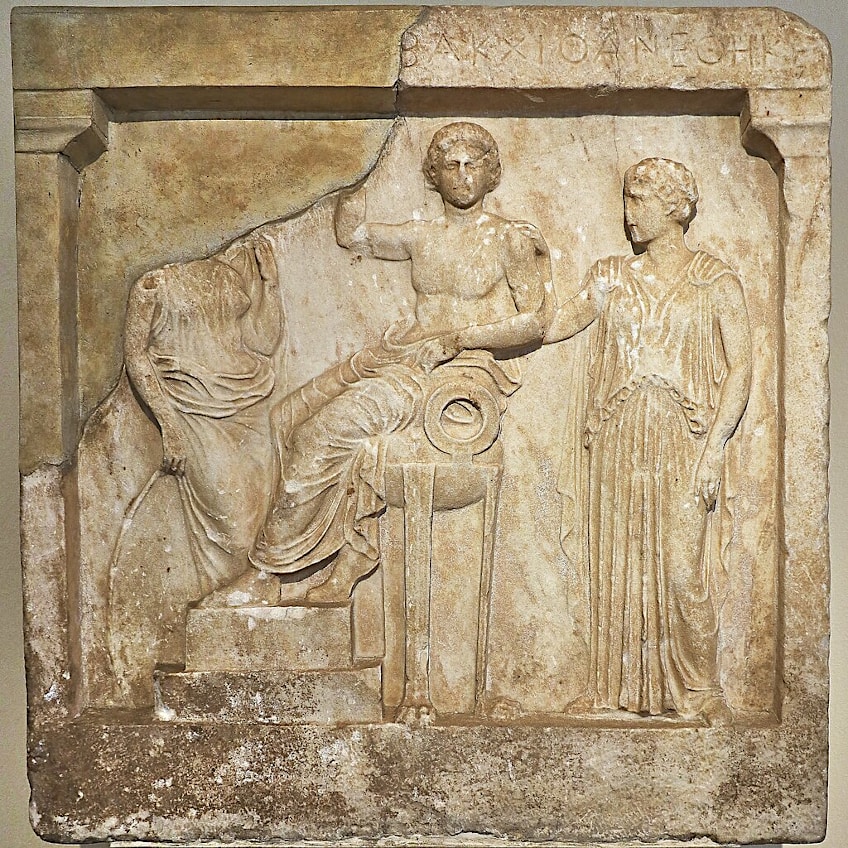 Votive relief showing Apollo seated on his oracular tripod flanked by Leto and Artemis (5th Century BCE); George E. Koronaios, CC BY-SA 4.0, via Wikimedia Commons
Votive relief showing Apollo seated on his oracular tripod flanked by Leto and Artemis (5th Century BCE); George E. Koronaios, CC BY-SA 4.0, via Wikimedia Commons
Coeus is also associated with several cerebral things, his name seeking knowledge or having intelligence, his connection to the heavenly axis and its stars which are associated with heavenly oracles, and his own personal myth of madness-induced strength breaking adamantine chains. More evidence is presented as his sister-wife’s seat Delphi was considered the ‘omphalos’ or the navel or center of the world, in a mirror to how Coeus was ‘polos’ as the central axis of the heavens. And just as Delphi was said to be guarded on earth by the dragon Drakon, so the ancients observed that the heavenly axis was guarded in the sky by the Alpha Dra star, one of the stars that make up the “dragon” constellation Draco.
Coeus was thus suggested to be the oracular voice of the sky father Uranus, as his wife Phoebe is the oracular voice of the earth mother Gaia.
This theory, however, is unsupported in texts and his descendants could have ‘inherited’ their powers solely from his sister-wife, and in particular, his fighting on the losing side of the Titanomachy casts doubts on any prophetic talents he may have had. The idea has also led to the suggestion that Hyperborea, the far-northern land of paradoxical eternal spring that was favored by Apollo and was the “winter home” for which he left Delphi to Dionysus, was visited because it was between his two grandparents; Pheobe at Delphi and Coeus at the northern axis pole. Hyperborea is considered the birthplace of Coeus’ daughter Leto even more so than the Isle Kos, so the association with this far-northern land may have been extended to him much like the Isle Kos’ name was.
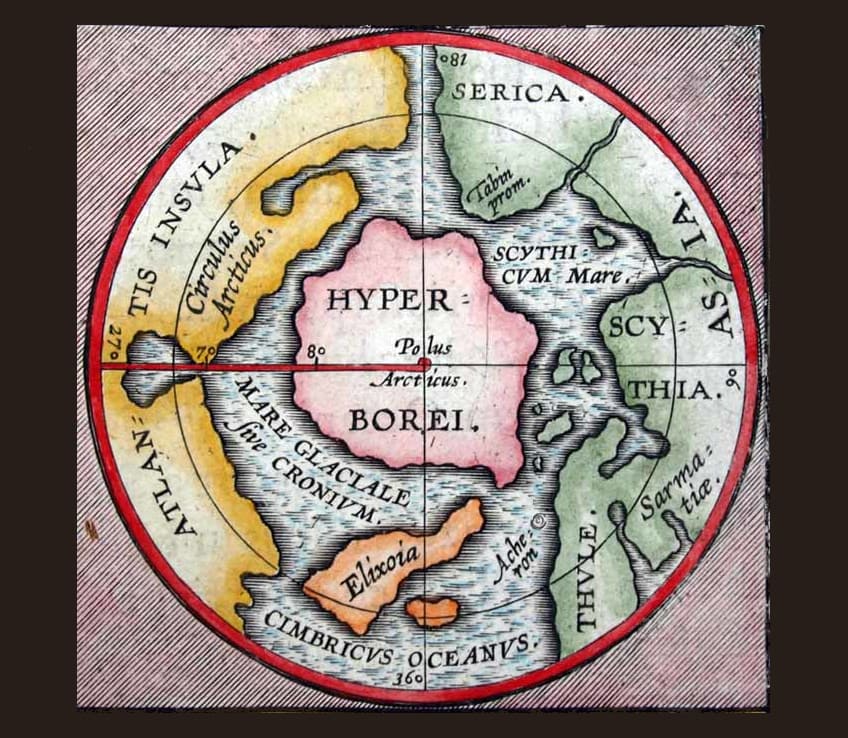 Map inset showing the supposed location of the mythical land of Hyperborea at the north pole from Arrian’s World by Ortelius (1624); Abraham Ortelius, Public domain, via Wikimedia Commons
Map inset showing the supposed location of the mythical land of Hyperborea at the north pole from Arrian’s World by Ortelius (1624); Abraham Ortelius, Public domain, via Wikimedia Commons
Whether his supposed oracular powers become accepted or not, Coeus has gained an association with intelligence and farsight in the modern day. This has led to some attributing him as the Greek god of intelligence or intellect, with a focus on the ‘questing mind’ or rational aspects of intelligence, though the aspects of knowledge, reason, and wisdom are usually attributed to either his grandson the god Apollo, or the goddess Athena and her mother Metis.
The Greek God Coeus’ Legacy
We know very little about Coeus outside of his place amongst Gaia and Uranus’ Titan children and the popularity of his descendants. He may have been honored through his relationships with them, such as his identification with the island Kos as the birthplace of his daughter Leto or her own honoring with Delian Apollo, but any evidence of such is little known. Coeus’ obscurity is perhaps best encapsulated by Ovid (1st century BCE – 1 century ACE) describing Leto as a Titaness “whom Coeus sired, whoever he may be”.
We are never given any epithets or descriptors of the god’s appearance or personality in surviving texts. Titans overall were considered much more belligerent than their Olympian counterparts.
As a Titan god Coeus is considered to be both strong in power and fierce in personality, and through his name may have claimed a nature of intelligence before he ultimately fell into madness after his imprisonment in Tartarus. His attributed representations include a muscled figure and a long and full head and beard. Coeus’ symbols are similarly mysterious as we have no idea what animals, plants, weapons, or items he could have been associated with or held sacred. The few things that could be considered to be Coeus’ symbols are the celestial axis and perhaps the northern heavenly pillar he embodies.
 In ancient Greek cosmology Coeus was the norther pillar holding up the sky; artist’s impression
In ancient Greek cosmology Coeus was the norther pillar holding up the sky; artist’s impression
It is interesting to note that so little information is available on Coeus, other than his name and relations that aside from his mad prison-break all we have is speculation and suggestion. In trying to understand his obscure personage, theorizing can itself become mythmaking, much like the suggestion that many of the Titans and other gods were named as mere placeholders filling gaps in narratives or rounding numbers in group listings. Coeus has certainly gained much characterization in the modern-day, with few actually supported sources, but perhaps our “querying” god would appreciate the sheer spirit of inquiry and debate his obscurity has sparked.
Also, a product of the modern day is Coeus’ inclusion in the popular fantasy-adventure novel series The Heroes of Olympus. Rick Riordan has the Titan appear under the name of Koios in The House of Hades, advocating to reclaim the world from Zeus.
Lessons Learned of the Titan Coeus
The Titan Coeus is a bit of a tragic figure, existing mainly as a member of the bygone golden era. Coeus shows that history is written by the victors and that life holds no promises even if you do everything to build yourself up, your fate can flip overnight. Coeus went from being one of the most powerful rulers of the world to being a god driven to madness by the yoke of his sentence. In the worst prison in existence, a once pillar of the world musters one explosive, manic escape across the dangerous landscape only to be repelled by the underworld’s guardians. Coeus as a Greek god of intelligence, as the very embodiment of intellect and a seeker of knowledge, reduced by suffering to a frantic creature attempting a nigh impossible rise to the heavens cuts a truly pitiful figure.
At the same time, the strength of his spirit and the resolve of his mind are admirable. Instead of succumbing to despair, Coeus sought freedom and managed to break free from his Zeus-given chains after being tormented in the abyss of Tartarus.
What is more is that he will presumably seek revenge as he invoked both Kronos and Tityus, enemies of Zeus who also suffered greatly at the god’s hands. He is also listed amongst the Gigantes which, as they were born from Uranus blood spilled during the Titan’s attack, may hint at a role in the War of the Giants or be a simple case of confusing the two groups and their wars. Coeus may be considered mad but there is no denying his power and tenacity. There is something admirable in his defiance, a determination despite his fate that we could draw on in our every day.
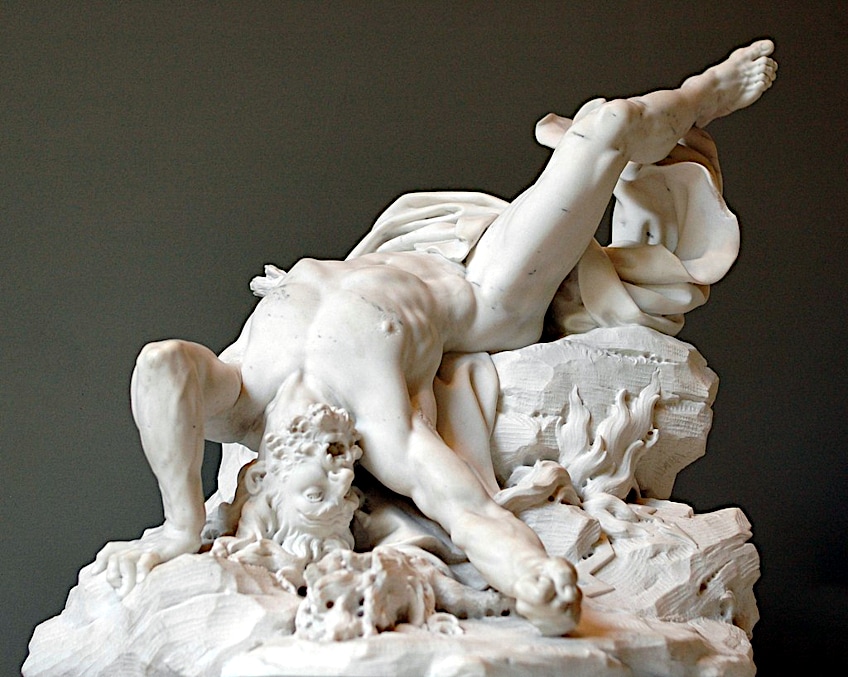 Titan Struck by Lightning by François Dumont (1712); Louvre Museum, Public domain, via Wikimedia Commons
Titan Struck by Lightning by François Dumont (1712); Louvre Museum, Public domain, via Wikimedia Commons
You may not ever be on the losing side of a war of the gods, but we all have our own battles to fight. Having the courage and heart necessary to refuse to accept your poor circumstance, to keep fighting beyond the realm of what is easy or even good sense, is a gift we could all use in our lives. Coeus himself may not have had an enduring place in Greek writings and culture, becoming an obscure figure of speculation, but he does possess an enduring resolve that despite his role on the ‘wrong side’ of history is shining evident for all to see.
The Greek god Coeus is an obscure god despite being pivotal in both his role as one of the ambushers of Uranus and the sire and grandsire of powerful deities who play the active role he himself lacks in surviving writings. From being an upholder of the sky upon which the heavens turn to a defeated Titan of Tartarus who shows even gods can break, the Titan Coeus is a case study in the fickleness of fortune and defiance in the face of a poor fate. The fragments that remain of him tease a fascinating figure behind this now stranger of ancient Greek mythology that we hope you have enjoyed scratching the surface of.
Frequently Asked Questions
What Was Coeus the God Of?
Coeus, also known as Koios or Polos, was considered to rule the central axis that the sky and stars would turn upon, as well as one of the four heavenly pillars that held up the sky from the earth. Coeus is also reasoned by some to be the Titan god of intelligence and its embodiment.
What Does Coeus Mean?
Coeus itself is the Latin spelling of the Greek name of the same god ‘Κοιος’ or Koios. Koios is commonly translated to mean query or querying, though another translation is intelligence, which lends to him the title of the Greek god of intelligence. Another of his names is Polus, taken to mean of the northern pole, which references the axis of heaven.
Why Did Coeus Go Mad?
The Titan Coeus supported his brother Cronus when Zeus overthrew him during the ten-year war, known as the Titanomachy. He and his brothers, besides Oceanus, were imprisoned in Tartarus, the torturous abyss that served as a place of punishment for the wicked among immortals and mortal souls. Coeus eventually descended into madness, breaking his chains, and attempted to escape before he was turned back by the guardians of Hades.

I am deeply passionate about history and am constantly fascinated by the rich and complex stories of the past. As the editor-in-chief of learning-history.com, I have the opportunity to share this passion with a wide audience through the creation and distribution of engaging and informative content about historical events, persons, and cultures. Whether it’s through writing articles and blog posts or creating videos or podcasts, I strive to bring the past to life in a way that is both accurate and enjoyable. My expertise in history, combined with my strong writing and communication skills, allows me to effectively communicate complex historical concepts and make them accessible and interesting to a wide range of readers. I am truly grateful for the opportunity to share my love of history with others through my work on learning-history.com.

